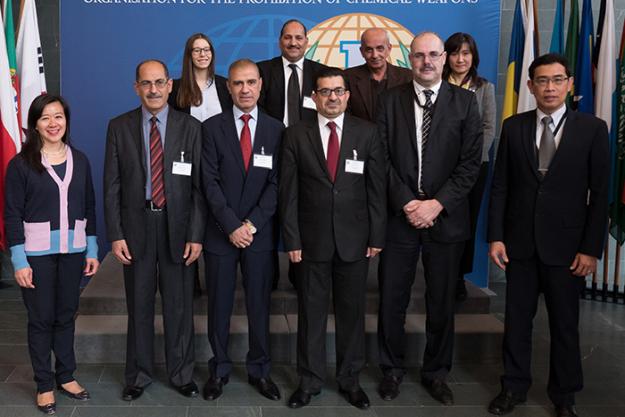
Iraqi officials at a National Legal Workshop held at the OPCW Headquarters
THE HAGUE, Netherlands – 10 April 2018 – Iraqi officials received assistance in reviewing their national legal and regulatory framework and prepared a roadmap towards the implementation of the provisions of the Chemical Weapons Convention (CWC) into the domestic legislation, during a National Legal Workshop at the Organisation for the Prohibition of Chemical Weapons (OPCW), held at the OPCW Headquarters from 4-6 April.
The workshop was attended by five representatives from the Iraqi National Monitoring Authority, the Higher Judicial Council and the National Security Council.
It came at a critical juncture for Iraq which is currently revising its laws regulating dual use chemicals.
Dr Essam Al-Sadi, Legal Advisor from the National Security Council and head of the delegation, acknowledged the timeliness of the event and stated that, ‘’The workshop has enabled us to identify the gaps in our national law and regulations that we need to address, and has also provided us with an understanding of specific legal issues relating to the implementation of the CWC in Iraq”.
The workshop resulted in a roadmap towards the full CWC implementation into Iraqi laws, including legislative steps as well as ways to overcome possible challenges.
OPCW experts also assisted the participants gain detailed knowledge of the CWC and analyse gaps in Iraq’s legislative framework in relation to the Convention. Attendees also honed their legal drafting skills, preparing legal texts in line with the Convention and consistent with Iraq’s constitutional requirements.
Background
The workshop was facilitated by OPCW Technical Secretariat’s Implementation Support Branch (ISB) that facilitates a number of programs aimed at assisting States Parties in developing and adopting implementing legislation on the Chemical Weapons Convention, including legal workshops, Internship Programme for Legal Drafters and National Authority representatives, and the review of the texts of draft legislation that are submitted to the Technical Secretariat for comments.
As the implementing body for the Chemical Weapons Convention, the OPCW oversees the global endeavour to permanently eliminate chemical weapons. Since the Convention’s entry into force in 1997 – with its 192 States Parties – it is the most successful disarmament treaty eliminating an entire class of weapons of mass destruction.
Over 96 per cent of all chemical weapon stockpiles declared by possessor States have been destroyed under OPCW verification. For its extensive efforts in eliminating chemical weapons, the OPCW received the 2013 Nobel Prize for Peace.
